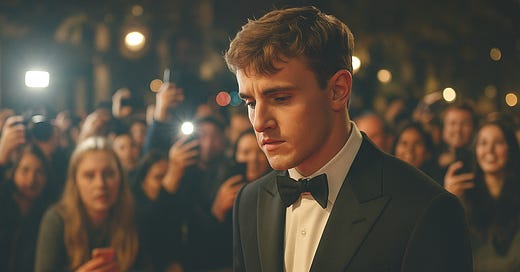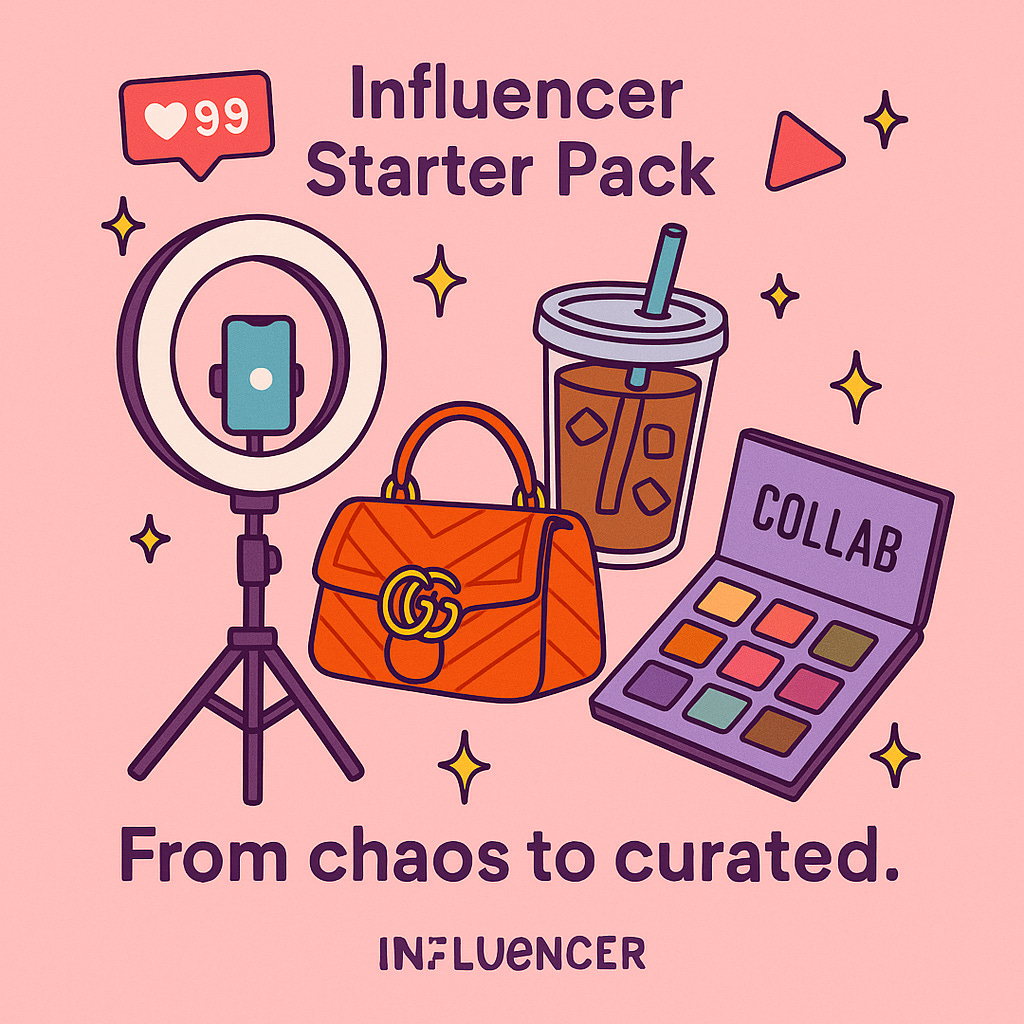You know that feeling when you discover someone online and you're like, "Oh my god, this person gets it"?
When you find yourself watching their content at 2 AM, sending it to friends, maybe even getting a little protective when other people discover them too?
Yes, well, I need to talk about what happens next.
It was my usual Saturday morning ritual - gym session with a podcast in my ears. That day, it was The Colin & Samir Show, and specifically, the episode, "Walking Away from 15 Million YouTube Subscribers."
They were discussing Luke Nichols from the Outdoor Boys and his decision to step back from the platform, exploring what they called the "paradox of fame" for creators.
And then, in the middle of the episode, they referenced this quote from Jonah Hill:
"You become famous for being you, and then suddenly you can't be you anymore."
Jesus. That hits hard, doesn't it? There's something almost tragic about it, saying goodbye to the very thing that made someone special in the first place.
But the quote only tells half the story.
What about us? What about the fans?
Have you ever caught yourself scrolling past someone who used to be a must-watch? A must-listen? Not because they did anything wrong - just because … something shifted?
I’m calling it the potency curve.
The fan journey.
The emotional arc we rarely talk about.
The Potency Curve: Catching Lightning (Before it’s Bottled)
Act I: The "OMG, He's Just a Normal Dude!" Phase – Enter Paul Mescal
Let me tell you about my Paul Mescal problem.
I've been a Paul Mescal fan from the very, very beginning. And I mean, Normal People beginning.
Back then, Paul Mescal wasn't "Paul Mescal™." He was just this soft, spoken Irish guy I frantically googled with "is he actually like that in real life?" because his performance felt so genuine, I was convinced, or should I say hopeful, he wasn’t acting.
In those early press junkets, he was endearingly awkward. He'd stumble over interview questions, wear suits that were slightly too big, and look genuinely bewildered when journalists asked about his "method."
I was glued, invested, irrationally emotional - the whole thing.
Act II: The "Wait, They Know Your Name?" Shift – Aftersun and a Nod from the Academy
Then Aftersun happened, and the industry sat up. The performance? Sublime. Yet, even with an Oscar nomination blinking in his direction, Paul still seemed genuinely gobsmacked.
It was like his fame-processing software hadn't quite caught up with the global download speeds.
He was still giving those endearingly awkward interviews. Still talking as if he couldn't believe people had actually watched the film, let alone cried through it (guilty!).
That disarming humility was still firmly in place.
Act III: The "Are Those… Designer Threads?" Transformation – All of Us Strangers and Beyond
And then things started to shift.
Paul Mescal wasn’t emerging anymore - he was established.
The acting stayed raw, emotionally gut-punching.
But off-screen, that Normal People innocence was beginning to fade.
Not gone - just quieter.
You could still catch glimpses of it though - like during the All of Us Strangers promo tour.
Paul on the red carpet with Andrew Scott.
Andrew looked like he was born in a designer suit.
Paul looked like he’d borrowed his - still working out how to smile through a thousand flashes.
Then Andrew leans in and shows him what to do with his hands.
A quiet, blink-and-you-miss-it masterclass in Celebrity 101.
Act IV: The "He Belongs Here (And I Barely Recognise Him)" Arrival
Fast forward to the History of Sound promo tour.
Paul hits the red carpet in head-to-toe black Gucci - sharp blazer, flared trousers, loose tie.
It was slick. Intentional. It said: I belong here.
And he did.
No more awkward glances.
No Andrew Scott whispering hand-placement tips.
Just full-blown confidence.
He looked incredible.
He also looked… famous.
And that’s when it happened - the shift.
You know the one: from “he’s everything” to “he’s definitely something.”
And he’s about to play a Beatle.
What hope is there now of Connell ever returning?
That’s the potency curve.
It creeps in - one red carpet at a time - and suddenly you’re not obsessing, you’re observing.
Still impressed. But no longer attached.
The Pattern Recognition: It's Not Just Paul
Then there’s Mikayla Nogueira.
When I first found her, I remember thinking, wow, she is chaos in the best way - hoodie on, hair up, thick Boston accent, flying through a mascara review like her life depended on it. No lighting setup, no branding - just Mikayla being Mikayla.
She was loud, messy, completely magnetic.
Now? Full glam, perfect lighting, slick backdrops, product placements everywhere, I swear even her houseplants were sponsored.
She’s built an empire. Good for her.
But I don’t stop to watch anymore.
Not because she’s done anything wrong.
Just … because whatever made me feel close to her doesn’t feel as close anymore.
That’s the potency curve again.
The raw, unpredictable magic gets refined - and the connection, somehow, starts to fade.
Paul walked red carpets. Mikayla landed mega brand deals.
They polished up. Leveled up. Earned it.
But before all that, they were just … people.
And honestly? That was the superpower.
We say we want connection - something real. But fame chips away at that.
The more polished someone becomes, the less human they seem.
Do we still watch? Still listen?
Sure.
But is it out of habit… or actual connection?
There’s this sweet spot - a kind of fame limbo - where someone’s on the rise but still feels like one of us.
That’s the magic window.
No handlers. No perfect lighting. No image to maintain. Just a person, showing up.
Billie Eilish before Ocean Eyes blew up.
Emma Chamberlain before the Louis Vuitton invites.
Just raw, relatable, almost accidentally brilliant.
Maybe that’s why platforms like TikTok, YouTube and podcasts exploded.
They feel like you’re sitting across from someone - not watching them from behind a velvet rope.
It Was Never Really About Paul Mescall
Let’s go back to Jonah Hill’s brutal little truth:
“You become famous for being you - and then suddenly you can’t be you anymore.”
Still packs a punch.
Fame doesn’t just change the creator - it changes the connection.
We fall for real. Then real becomes performance.
Maybe that says more about fame than it does about us.
Either way, I’m still working through my Paul Mescal feelings.
But I know now - it’s not really about Paul.
Have you felt it too? That quiet shift when a creator just stops feeling like they used to?
Let me know.






I love this perspective but do you think there is a place for both but perhaps not in the same human?
Do we want the “non-famous” human connection and also the “famous” slightly more disconnected celebrity relationship? I think ‘yes’ because that disconnected relationship helps us to distinguish between what’s real and what’s not.
Both types of para-social relationships (connections) give us an emotional payoff, it’s just that one feels real, like the human is actually in your life and one is obviously distant (and makes you less prone to grieving their evolution).
Hi Lauren, thanks for reading the post and for your reply. I completely agree with you, there’s definitely a place for both. I think it’s the evolution that distinguishes them. For example, if I meet a celebrity, I view them differently than if I met them as an ‘unknown’ who evolved into fame. Thanks for subscribing Lauren, it makes it all worthwhile.